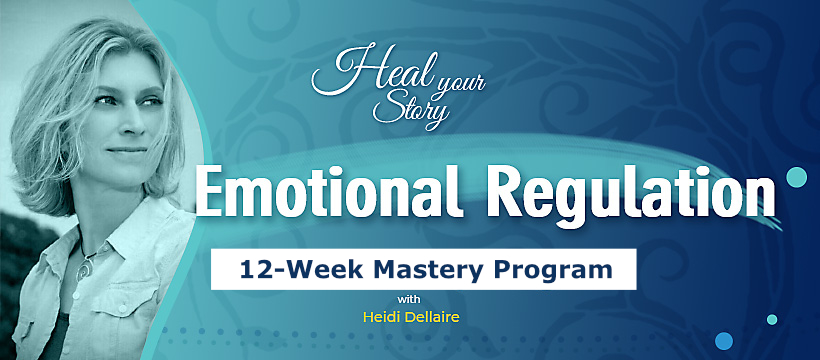I understand anxiety and emotional triggers all too well as an empath. Struggling with these emotions in my younger years and then wanting to heal and help others heal, led me down a path of becoming a Holistic Health Practitioner, Meditation and Mindfulness Teacher, and an Emotional Health and Empowerment Coach. So let’s have a little chat about why you may still be struggling with anxiety and other emotional triggers if you have been trying to cure it all on your own or with medication only.
Anxiety is a common mental health condition that affects millions of people around the world. It can manifest in various ways, from general feelings of unease and worry to full-blown panic attacks. Triggers are events or situations that can activate anxiety and other negative emotional responses. Although triggers and anxiety can be difficult to manage, it’s not impossible to live a fulfilling life with these challenges.
One of the key components of managing triggers and anxiety is coregulation of the nervous system. This is a process in which individuals learn to regulate their nervous system through a variety of techniques, such as mindfulness, breathing exercises, and other interventions. Coregulation is a collaborative process that involves working with a trained professional, therapist or coach, who can help individuals identify their triggers and develop effective strategies for managing them.
The nervous system plays a crucial role in regulating our emotional responses. The autonomic nervous system is responsible for the regulation of our physiological responses, such as heart rate, breathing, and digestion. When we experience anxiety or triggers, the sympathetic nervous system is activated, which causes a cascade of physiological responses, such as increased heart rate, rapid breathing, and muscle tension. This activation is part of our body’s natural stress response, which is meant to prepare us to deal with potential threats.
However, when these responses become chronic or intense, they can negatively impact our physical and mental health. Chronic stress can lead to various health problems, such as cardiovascular disease, gastrointestinal disorders, and mental health conditions, such as depression and anxiety.

Coregulation of the nervous system can help to mitigate the negative effects of chronic stress and anxiety. Individuals can learn to regulate their nervous system and reduce the impact of triggers and anxiety by engaging in various techniques. For example, deep breathing exercises can activate the parasympathetic nervous system, which is responsible for the “rest and digest” response, leading to a decrease in heart rate, lower blood pressure, and a feeling of relaxation.
Another technique used in coregulation is mindfulness. Mindfulness involves paying attention to the present moment without judgment. This technique can help individuals become more aware of their emotional and physical experiences, which can lead to a better understanding of their triggers and how to manage them effectively.
Coregulation of the nervous system is not a one-size-fits-all approach. Every individual is different, and what works for one person may not work for another. Working with a trained professional, such as a therapist or coach, can be helpful in identifying effective techniques and developing a personalized plan for managing triggers and anxiety.
Dr. Bessel van der Kolk, a renowned trauma expert, discusses the importance of the body in the treatment of trauma in his book “The Body Keeps the Score.” Dr. van der Kolk emphasizes that the body plays a crucial role in emotional regulation, and that traumatic experiences can become stored in the body, leading to a variety of physical and mental health problems.
According to Dr. van der Kolk, traditional talk therapy alone is not sufficient in treating trauma. He suggests that incorporating the body into the therapeutic process is essential for long-term healing. Coregulation of the nervous system is one way to incorporate the body into the treatment of trauma.
Listen to the latest episodes of the Heal Your Story Podcast
Coregulation can eventually lead to self-regulation of the nervous system. Self-regulation involves the ability to regulate one’s own nervous system without the help of a therapist or coach. Through consistent practice and repetition of coregulation techniques, individuals can develop the skills necessary for self-regulation.
Self-regulation can lead to a sense of empowerment and control over one’s emotional and physical experiences. By learning to regulate their own nervous system, individuals can become more resilient in the face of triggers and anxiety, leading to improved overall health and well-being.
In conclusion, managing triggers and anxiety is not about simply getting rid of them. It is more about befriending them and getting curious about them. Allowing the body to feel them as just “feelings” allows us to move into states where we can start to handle anything that is thrown our way. Through the process of safe coregulation with a therapist or a trauma-informed coach, you fill your toolbelt with tools to allow you to start on the path of self-regulation. It’s a sweet place to get to when we can manage our own emotions and triggers.
If you are needing or wanting help with reducing your anxiety, and regulating your emotions and triggers, I would love to help. You can learn more about my work and sign up for a Heal Your Story Breakthrough Intensive.
Sending lots of love and healing.
~Heidi


